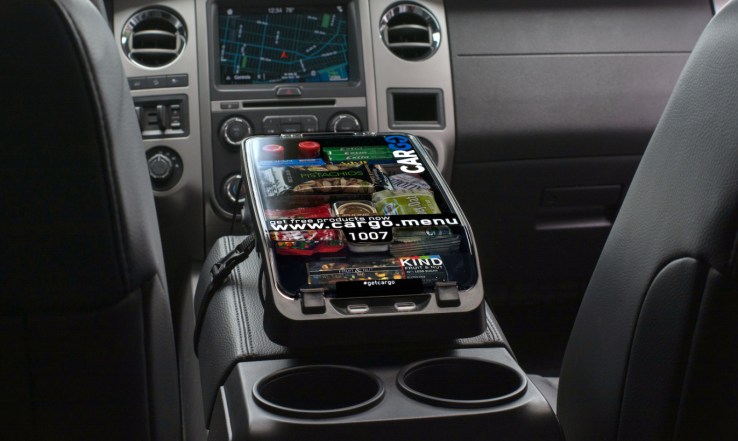Cargo raises $5.5M to let Uber drivers sell snacks and essentials nationwide

Cargo, a startup that wants to let every rideshare driver open their own convenience store in their car, has just raised $5.5 million in a round it’s calling seed preferred financing.
Over the summer we covered the company’s $1.75 million seed round, at which point they were just getting started. Now they have 2,500 cars on the road in NYC, Chicago, Boston and Minneapolis, with 20,000 driver signups from all 50 states.
The funding comes from CRCM Ventures and eighteen94 capital, which is Kellogg’s venture capital fund. Kellogg is also an early customer of Cargo, which, along with companies like Mars Wrigley and Red Bull, uses the startup as a marketing and distribution channel to push free products to Cargo passengers. In return for providing the free products and paying a marketing fee, these CPG companies get anonymous data about when their products are given away, so they can figure things out like what time of they day their products would sell best.
“Cargo represents eighteen94 capital fund’s first channel investment. We see huge potential in the new consumer touchpoint within the passenger economy that Cargo is developing,” explained Simon Burton, managing director of eighteen94 capital in a statement. “Cargo provides brands with innovative opportunities to connect to the consumer in their moment of need.”
These free samples also help Cargo sell its paid goods — about 30 percent of all transactions come after someone had first tried a free transaction to get one of the sponsored items available. Drivers get a 25 percent commission on each paid order plus a $1 base commission for each order (including free products), with the average driver earning around $100-$115 per month. However the top 10 percent of drivers are converting somewhere between 30-60 percent of riders into customers and making up to $275 per month.
So far it’s about a 50-50 revenue breakdown between Cargo selling products directly to riders and receiving distribution deals from product manufacturers. The startup plans to deploy its hardware and software solution in about 20,000 cars and open in one new city each month for the next six months before trying to raise a Series A to propel them to 100,000 cars and beyond.